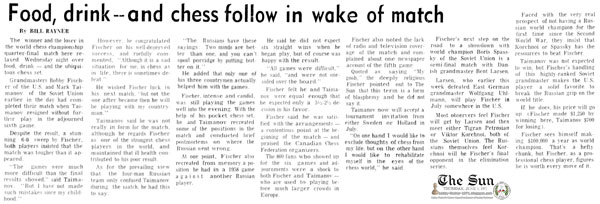The Vancouver Sun Vancouver, British Columbia, Canada Thursday, June 03, 1971 - Page 5 ★
Food, Drink -- and Chess Follow in Wake of Match by Bill Rayner
The winner and the loser in the world chess championship quarter-final match here relaxed Wednesday night over food, drink — and the ubiquitous chess set.
Grandmasters Bobby Fischer of the U.S. and Mark Taimanov of the Soviet Union earlier in the day had completed their match when Taimanov resigned without further play in the adjourned sixth game.
Despite the result, a stunning 6-0 sweep by Fischer, both players insisted that the match was tougher than it appeared.
“The games were much more difficult than the final results showed,” said Taimanov. “But I have not made such mistakes since my childhood.”
However, he congratulated Fischer on his well-deserved success, and ruefully commented, “Although it is a sad situation for me, in chess as in life, there is sometimes defeat.”
He wished Fischer luck in his next match, “but not the one after because then he will be playing with my countryman.”
Taimanov said he was not really in form for the match, although he regards Fischer as one of the strongest chess players in the world, and maintained that ill health contributed to his poor result.
As for the prevailing view that the four-man Russian team only confused Taimanov during the match, he had this say:
“The Russians have these sayings: Two minds are better than one, and you can't spoil porridge by putting butter on it.”
He added that only one of his three countryman actually helped him with the games.
Fischer, intense and candid, was still playing the games well into the evening. With the help of his pocket chess set, he and Taimanov recreated some of the positions in the match and conducted brief postmortems on where the Russian went wrong.
At one point, Fischer also recreated from memory a position he had in a 1958 game against another Russian player.
He said he did not expect six straight wins when he began play, but of course was happy with the result.
“All games were difficult,” he said, “and were not one-sided over the board.”
Fischer felt he and Taimanov were equal enough that he expected only a 5½-2½ decision in his favor.
Fischer said he was satisfied with the arrangements—a contentious point at the beginning of the match—and praised the Canadian Chess Federation organizers.
The 800 fans who showed up for the six games and adjournments were a shock to both Fischer and Taimanov — who are used to playing before much larger crowds in Europe.
Fischer also noted the lack of radio and television coverage of the match and complained about one newspaper account of the fifth game.
Quoted as saying “My gosh,” the deeply religious Fischer pointed out to The Sun that this term is a form of blasphemy and he did not say it.
Taimanov now will accept a tournament invitation from either Sweden or Holland in July.
“On one hand I would like to exclude thoughts of chess from my life, but on the other hand I would like to rehabilitate myself in the eyes of the chess world,” he said.
Fischer's next stop on the road to a showdown with world champion Boris Spassky of the Soviet Union is a semi-final match with Danish grandmaster Bent Larsen.
Larsen, who earlier this week defeated East Germany grandmaster Wolfgang Uhlmann, will play Fischer in July somewhere in the U.S.
Most observers feel Fischer will get by Larsen and then meet either Tigran Petrosian or Viktor Korchnoi, both of the Soviet Union. The Russians themselves feel Korchnoi will be Fischer's final opponent in the elimination series.
Faced with the very real prospect of not having a Russian world champion for the first time since the Second World War, they insist that Korchnoi or Spassky has the resources to beat Fischer.
Taimanov was not expected to win, but Fischer's handling of this highly-ranked Soviet grandmaster makes the U.S> player a solid favorite to break the Russian grip on the world title.
If he does, his price will go up (Fischer made $1,250 by winning here, Taimanov $700 for losing.)
Fischer sees himself making $100,000 a year as world champion. That's a hefty chunk, but Fischer, as a professional chess player, figures he is worth every move of it.























